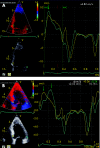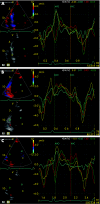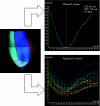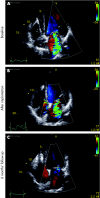Optimal use of echocardiography in cardiac resynchronisation therapy
- PMID: 17933989
- PMCID: PMC2016900
- DOI: 10.1136/hrt.2005.076422
Optimal use of echocardiography in cardiac resynchronisation therapy
Abstract
Echocardiography has several roles in patients with cardiac resynchronisation therapy (CRT). First, it can optimise selection of CRT candidates by demonstration of left ventricular (LV) dyssynchrony. Second, it can be used to assess immediate response to CRT, including detection of acute LV resynchronisation. Echocardiography is also useful to evaluate long-term benefit from CRT. Finally, echocardiography is important in optimisation of pacemaker settings, including AV and VV optimisation.
Conflict of interest statement
Competing interests: None declared.
Similar articles
-
Echocardiographic evaluation of cardiac dyssynchrony for predicting a favourable response to cardiac resynchronisation therapy.Heart. 2004 Dec;90 Suppl 6(Suppl 6):vi17-22. doi: 10.1136/hrt.2004.048322. Heart. 2004. PMID: 15564420 Free PMC article. Review.
-
Triplane tissue Doppler imaging: a novel three-dimensional imaging modality that predicts reverse left ventricular remodelling after cardiac resynchronisation therapy.Heart. 2008 Mar;94(3):e9. doi: 10.1136/hrt.2007.122564. Epub 2007 Nov 5. Heart. 2008. PMID: 17984218
-
Usefulness of left ventricular systolic dyssynchrony by real-time three-dimensional echocardiography to predict long-term response to cardiac resynchronization therapy.Am J Cardiol. 2009 Jun 1;103(11):1586-91. doi: 10.1016/j.amjcard.2009.01.372. Epub 2009 Apr 8. Am J Cardiol. 2009. PMID: 19463520
-
Echocardiographic markers of dyssynchrony as predictors of super-response to cardiac resynchronisation therapy - a pilot study.Cardiovasc Ultrasound. 2018 Oct 2;16(1):24. doi: 10.1186/s12947-018-0140-0. Cardiovasc Ultrasound. 2018. PMID: 30285762 Free PMC article.
-
Stress echocardiography for selecting potential responders to cardiac resynchronisation therapy.Heart. 2010 Jul;96(14):1142-6. doi: 10.1136/hrt.2010.199828. Heart. 2010. PMID: 20610460 Review.
Cited by
-
Patient assessment for cardiac resynchronization therapy: Past, present and future of imaging techniques.Can J Cardiol. 2010 Jan;26(1):27-34. doi: 10.1016/s0828-282x(10)70332-9. Can J Cardiol. 2010. PMID: 20101354 Free PMC article. Review.
-
Cardiac resynchronization therapy during rest and exercise: comparison of two optimization methods.Europace. 2008 Oct;10(10):1161-9. doi: 10.1093/europace/eun216. Epub 2008 Aug 27. Europace. 2008. PMID: 18753213 Free PMC article. Clinical Trial.
-
Cardiac resynchronization therapy; the importance of evaluating cardiac metabolism.Int J Cardiovasc Imaging. 2010 Mar;26(3):293-7. doi: 10.1007/s10554-010-9597-0. Epub 2010 Feb 12. Int J Cardiovasc Imaging. 2010. PMID: 20148366 Free PMC article. No abstract available.
-
Evidence of scar tissue: contra-indication to cardiac resynchronization therapy?Int J Cardiovasc Imaging. 2011 Jan;27(1):59-63. doi: 10.1007/s10554-010-9664-6. Epub 2010 Jul 8. Int J Cardiovasc Imaging. 2011. PMID: 20614190 Free PMC article. No abstract available.
-
Relationship between left ventricular dyssynchrony and reverse remodeling after cardiac resynchronization therapy.Clin Cardiol. 2011 Oct;34(10):645-8. doi: 10.1002/clc.20941. Epub 2011 Sep 12. Clin Cardiol. 2011. PMID: 21913208 Free PMC article.
References
Publication types
MeSH terms
LinkOut - more resources
Full Text Sources
Medical
Research Materials

















